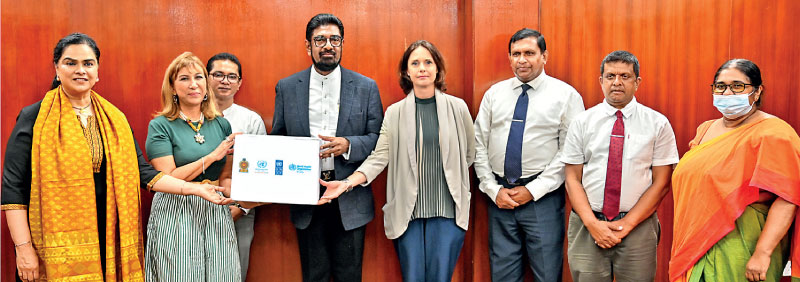Thursday Feb 26, 2026
Thursday Feb 26, 2026
Thursday, 15 September 2022 02:51 - - {{hitsCtrl.values.hits}}

From left: WHO in Sri Lanka Representative Dr. Alaka Singh, United Nations in Sri Lanka Resident Coordinator Hanaa Singer-Hamdy, Ministry of Health Director – Medical Technical Services and COVID-19 Coordinating In Charge Dr. Anver Hamdani, Health Minister Keheliya Rambukwella, UNDP in Sri Lanka Officer-in-Charge Malin Herwig, Ministry of Health Acting Secretary Pallegama, Health Ministry Medical Supplies Division Deputy Director General Dr. Herath, and Health Ministry Health Services Acting Director General Dr. Champika Wickremasinghe
Addressing the immediate needs of the ongoing socio-economic crisis, the United Nations Development Programme (UNDP) in Sri Lanka has come forward to procure and deliver vital and essential medicines and medical supplies for the country, together with the World Health Organization (WHO) in Sri Lanka with the financial support of the United Nations’ Central Emergency Response Fund (CERF).
The medicines and medical supplies were handed over to the Ministry of Health this morning, in the presence of Health Minister Keheliya Rambukwella by United Nations in Sri Lanka Resident Coordinator Hanaa Singer-Hamdy, UNDP in Sri Lanka Officer-in-Charge Malin Herwig, and WHO in Sri Lanka Representative Dr. Alaka Singh with the participation of wider representatives from partner organisations.
Highlighting the role of the UN in contributing towards health sector security, Hanaa Singer-Hamdy stated: “A number of favourable health indicators over the past years demonstrated that Sri Lanka’s health system was one of the most robust in the region. Together, we must ensure that the current crisis does not reverse these impressive results.
“Therefore, a comprehensive sectoral response is required to address the pressing needs that have arisen in the medical sector. Working in close coordination as outlined in the Humanitarian Needs and Priorities Plan (HNP) through WHO-led efforts and capitalising on UNDP’s global procurement network, the UN will continue to support and create lasting impacts on lives and livelihoods across the country.”
Speaking on the timeliness of the procurement of medical items, Ministry of Health Director – Medical Technical Services and COVID-19 Coordinating In Charge Dr. Anver Hamdani commented: “In the current Sri Lankan context, the medical sector has been gravely affected due to the shortages of medicine and other vital items in order to serve the people in need.
“The Ministry of Health is grateful for the support provided in the procurement of life saving essential and non-essential medical items for the people of Sri Lanka and look forward to the continued collaboration in this effort.”
Sri Lanka’s socio-economic crisis has pushed the health care system, with many vital and essential medicines and medical items in the public and private sectors being are out of stock. Concurrently, the price of drugs has increased by 30% islandwide.
UNDP and WHO working closely with the Ministry of Health identified gaps in availability of medicines, consumables, devices and equipment across the country, and have accordingly procured these vital and essential medicines and medical items.
Speaking to WHO’s role as the UN’s technical lead on health sector efforts, Dr. Alaka Singh noted: “Essential medicines have been particularly impacted by the current crises, with critical implications for the health system. Access to affordable and quality health care is crucial social protection, especially in difficult economic times.
“WHO appreciates donor response to the UN call for resources for medicines and to UNDP for accelerated procurement. WHO is continuing to work with the Ministry of Health to safeguard health in Sri Lanka.”
Commenting on the role of UNDP in bringing together stakeholders and facilitating such processes in times of need, Malin Herwig stated: “At this critical time, UNDP has utilised its global procurement network to quickly get the needed medicines to Sri Lanka, working closely with WHO Sri Lanka, along with all relevant counterparts to respond to the current context of the health sector. The medicines handed over today is one such effort, contributing towards the needs of the people of Sri Lanka.”